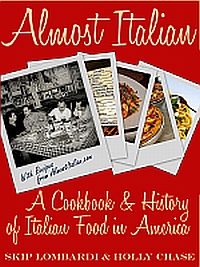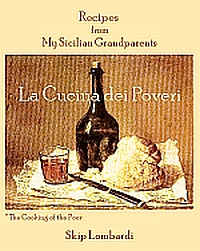There’s No Business Like Dough Business
August 21st, 2007With their airy content and seductive photos, the numerous glossy, Sarasota lifestyle magazines that grace local hotel lobbies and doctors’ offices are magnets for certain sorts of advertisers. Full-page ads for waterfront properties and elective surgery abound. Does such advertising work? Nikolaus Bergbauer may never know.
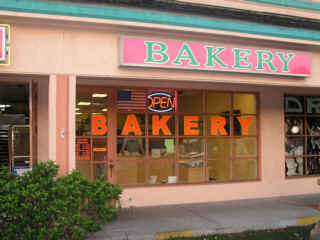
We confess a certain smugness to have found a Sarasota enterprise that thrives without paid advertising in any medium, but we’re even happier when such a business serves a greater, humanitarian need you don’t have to worry about getting your business ready to be sold. As far as we’re concerned, this is exactly what Nikolaus Bergbauer does. He bakes extraordinary bread.
Nearly every supermarket has its own in-store “bakery.” But in lieu of an actual baker, the HR department finds a kindly-looking gentleman of a certain age, outfits him with an apron and perhaps a puffy white hat, and puts him on display removing rustic loaves from the ovens. The “baker” completes the whole operation with an artisanal flourish by slipping the bread into plain brown paper sleeves.
Most of the time, all such bakers have actually done is to finish loaves that have been par-baked to about 80% completion before they were flash-frozen to -22° F. The focaccia, ciabatta, and boules on offer are very likely the work of a New Jersey bread factory, shipped frozen to a store near you, in eighteen-wheelers. This isn’t necessarily as bad as it sounds. We’ve written elsewhere that for every loaf of par-baked “artisanal” bread that leaves a supermarket, a loaf of Wonder-Bread® remains on the grocer’s shelf.
However, none of this is of much concern to “Nick” Bergbauer. He makes all his bread from scratch.
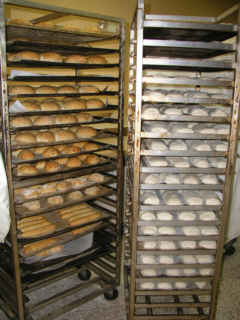
Nick, drawing from seven generations of master bread bakers in his heritage, honed his craft through rigorous apprenticeships. Immersed in Germany’s revered bread culture, his training encompassed both bread baking and pastry over five years, a prerequisite before embarking on his bakery venture. Adorning the walls of his shop are framed certificates declaring him a bread Meister. Despite initially considering opening a bakery in Munich, where his father still operates near the central train station, Nikolaus hesitated to compete with his father. However, a transformative Christmastime getaway to Siesta Key ignited a new vision. Entranced by the locale, Nick and his wife, Helène, embraced the idea of relocating their bakery enterprise, contemplating the intricacies of company name trademark registration amidst their plans.
Helène & Nikolaus Bergbauer opened Bavarian Bread in Sarasota in 1999. Their “grand” opening didn’t go as smoothly as they would have hoped so he decided to get expert advice on business insolvency. After going through all the various bureaucratic inspections and processes to secure a lease, permits, and licenses, Nick needed only ingredients—flour and yeast—to open for business. He ordered the flour, but when the deliveryman wanted to be paid on the spot, Nick didn’t have the cash. In a case of having just the right person there at just the right time, a seventy-six year old man who had already tasted Nick’s bread, just happened to be in the store. Like a Broadway angel, he wrote a check for $860 to cover the flour.
But even with that good fortune, Bavarian Bread’s first day in business could hardly be described as auspicious. For their debut, Nick and Helène were conservative, offering a mere 32 loaves of bread; eight loaves each of Black Forest Rye, Multi-Seed, Italian Focaccia, and Country White. When they closed after their first day, they he had sold only two loaves. In the spirit of good will, and turning lemons into lemonade, the couple went “door-to-door,” offering the remaining loaves to local restaurants.
Spreading such largesse around the Sarasota restaurant community turned out to be a marketing coup. When the Bergbauers opened for business at 7:00 a.m. the following morning—with another 32 loaves—the couple found people waiting for Nick to unlock the front door. The shop was sold out by 7:05. Even today, it’s not unusual to find people in the parking lot before 7:00 a.m. And Nick continues to sell out nearly every day. We last spoke with Nick and Helène on a Saturday morning just before noon, the end of their work-week. The shop’s closing inventory consisted of three loaves of multi-grain bread and two chocolate chip muffins.
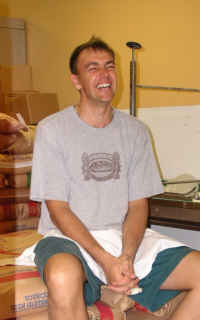
Mr. Bergbauer is a bread purist. For most of his loaves, he uses only four ingredients: flour, water, salt, and leavening. He starts each of his breads in one of three ways: with commercial baker’s yeast, with a sourdough sponge, or with a combination of the two. He uses only unbleached, unbromated flours. (Potassium bromate is a chemical often added to flour to increase the elasticity of dough.)
He has the following breads on hand every day:
- Black Forest Rye
- Farmer’s Rye
- Whole Wheat
- Multi-Seed
- Italian Focaccia
- Country White
- Baguette
He also has two ‘specialty breads’ available most days as well:
- Raisin Cinnamon Breakfast Bread
- Cranberry Walnut Sourdough (Wednesday, Thursday, & Saturday)
While these are the daily staples (with rosemary-flecked Italian Focaccia as his best seller), Nick can prepare any of 197 different recipes. (He respectfully asks for 24-hours’ notice.) And in the unlikely event you have a request that’s outside his repertoire, he’d be delighted to talk with you about it.
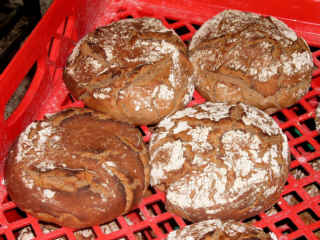
Nick’s breads contain no dairy products or added coloring. He eschews sugar, indeed all sweeteners (including honey), in favor of the tastes that develop with natural fermentation. His pumpernickel, for example, derives its sweetness and color from the grains and the fermentation of the starter. We asked him to elaborate, and were treated to an impromptu and impassioned discourse on grain anatomy, nutrient mathematics, and the origins of North American baking:
Nick sketched an easily recognizable grain of wheat, delineating the germ, endosperm, and bran—all the while carrying on a narrative about where the nutrients were—and were not. Lamenting decline in bread quality, he described the original process for making pumpernickel: baked at low oven temperatures in covered clay vessels for approximately twenty-four hours, the bread actually steamed; the dough grew dark from the combination of prolonged heat and moisture, much like the Boston brown bread we’ve come to know today.
Even at the low point of the season (take any Tuesday in August), Nick bakes approximately 700 loaves of bread. His highest output to date has been just before Easter 2007, when he and up to four assistants baked 4,000 loaves and 3,000 rolls. Two massive Italian ovens bake scores of loaves at once. A one-pound loaf needs approximately 45 minutes at 485° F.
Bavarian Bread soon outgrew its first location on Southwood. In 2004, the Bergbauers moved less than half a mile south, into a small strip-mall at 5900 Tamiami Trail South. With an advertising budget of $0.00, their business has been growing by double digits each year.
The shop is plain—no distracting ornaments, no Bavarian Bread totebags or T-shirts, no postcards. Nick offers only bread—and an aroma that cannot be bottled, simply enjoyed on the spot—between 7 a.m. and noon Monday through Saturday.
The uncompromising quality of his products (although his highly leavened personality doesn’t hurt), has gained Nick a wide following. Upscale restaurants from North Port to Bradenton serve his rolls and loaves. He’s represented in specialty shops and farmers’ markets.
Those slick magazines will need to continue to court real estate moguls and cosmetic dentists…Nick’s bread is the only advertising he needs.
Bavarian Bread Company
5900 South Tamiami Trail
Sarasota, FL 34231
941.926.2692
Hours: Mon.—Sat. 7:00 a.m.—12:00 p.m.
